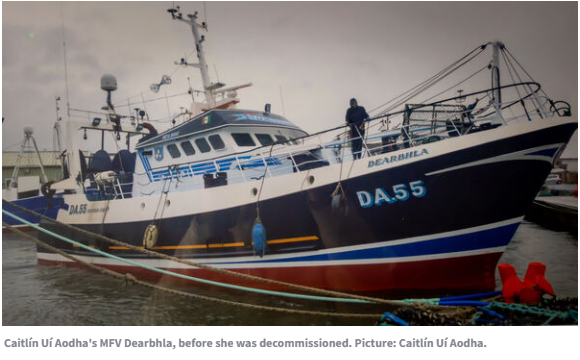Caitlín Uí Aodha’s family has fished since before the Famine. She lost her husband in the Tit Bonhomme disaster and returned to the sea herself. Now, she has decommissioned her fishing boat. Neil Michael reports.
Caitlín Uí Aodha doesn’t cry easily but tears aren’t far from her eyes when she talks about Dearbhla. While this is the name of her youngest daughter, it was also the name of her 25-metre trawler.
“It hurts, it really hurts,” she says through stifled sobs when she talks about it. She is upset because late last year, she closed a door on a proud fishing tradition that has been in her family for more than 150 years. She did what she never thought she would do: she applied to decommission the boat. The last trip was in December last year.
Her brother Tomas Kelly, who retired from fishing last year, was with her as they both stood in silence as the boat sailed slowly into Galway’s remote Rossaveel Harbour. Laden with its last catch, Tomas put a comforting arm around Caitlín’s shoulders as she shuddered with stifled sobs watching the boat approach the harbour wall in the drizzling rain. “She was very upset,” the 74-year-old, who had been with her for comfort but also to sail the boat to the breakers’ yard, recalled. “People probably wouldn’t really appreciate how much owners are invested in their boats. “Losing them is losing a part of their lives.”
The MFV Dearbhla is one of around 42 or so vessels to be scrapped in the Department of Agriculture’s €75m Voluntary Decommissioning Scheme.
Ireland’s fishing industry losses from Brexit will amount to around €43m a year by 2026 as part of a five-year EU-UK post-Brexit quota “adjustment” phase. This amount is the biggest single loss for any country, leading to repeated calls for equitable burden-sharing among all member states. Both schemes are funded by the €1bn Ireland got from the EU’s Brexit Adjustment Reserve (BAR) fund set up to help member states most affected by Brexit deal with the resulting adverse economic, social, territorial, and environmental consequences. After it was originally capped at €60m, Mr McConalogue put an extra €15m into the decommissioning scheme. But that has failed to dampen disquiet in the industry about the scheme among boat owners reluctantly having to accept a proportion of the total value of their boats back.
Added to that, instead of being able to sell them on, boat owners accepted for decommissioning have to scrap their boats and pay back funds they received during the pandemic. A number were paid not to fish for a number of months over the past two years under the Brexit Temporary Fleet Tie-Up Scheme. Caitlin and her brother are not the only ones banging the quota drum.
The leading fishing industry CEOs have been — in their own words — “blue in the face” trying to get successive Irish governments to up their game on the issue. They include Irish South and West Fish Producers Organisation’s Patrick Murphy, Irish Fish Producers Organisation’s Aodh O’Donnell, John Lynch, CEO of the Irish South and East Fish Producers Organisation and the Irish Fish Processors and Exporters Association’s Brendan Byrne.
Tomas sums up the feelings of the industry when he says: “On the bigger fishing boats, you had everything. “We had Sky TV, lovely hot showers and Wifi. “Quota is the main problem, and if we haven’t got quota in our own waters, we will end up without our own fishing fleet.

